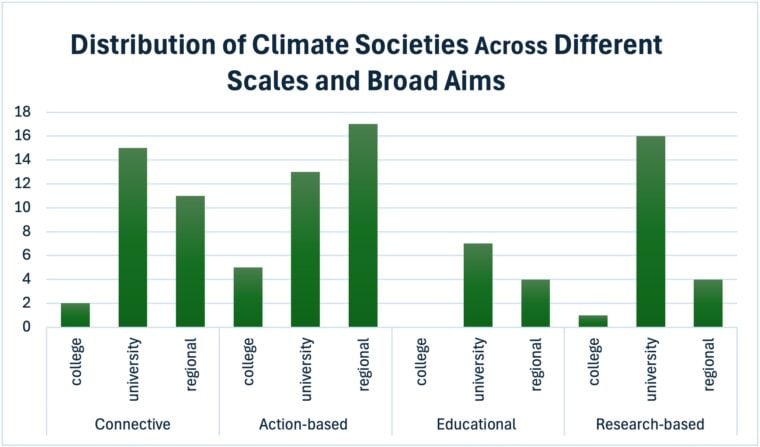Pasha Taylor is entering her final year studying Geography at the University of Cambridge. She is particularly interested in the dynamics of environmental stewardship at the university scale, is involved in the Cambridge Climate Society and is in the process of setting up ChuGreens, a green society in Churchill College. She believes that student engagement surrounding the environment is crucial to ensure that universities minimise their carbon footprint and students have the potential to transform the environmental policies of their associated institutions.
This piece is adapted from a separate article which Pasha had written for the CCS Journal.
What are climate societies, and effective youth activism
A Climate Society is an organization or community committed to supporting and
implementing climate change mitigation and adaptation efforts. These societies can
focus on specific environmental aspects like biodiversity or waste reduction, or they
may address broader issues related to social climate justice. The scale at which
societies operate varies massively, from local initiatives to international scale
mobilisations, such as extinction rebellion.
In June 2020, the UK parliament highlighted a rise in climate change activism, reflecting increased public concern over climate threats. Many
individuals experience ‘eco-anxiety,’ feeling guilt and shame over their carbon
footprints. This sentiment is partly fuelled by institutions shifting the responsibility for
the climate crisis onto individuals, allowing the continuation of exploitative,
environmentally degrading economic systems.
Youth are central to climate change mitigation efforts, as the current environmental
crisis is a cumulative issue that has developed over time. The urgency of addressing
climate change is underscored by its intensifying impacts. Young people are at the
forefront of climate activism, with universities serving as hubs for mobilization. These
institutions play a significant role in fostering eco-citizens through research,
education, and policy advocacy. Movements demanding mandatory climate change
education in universities highlight the importance of raising awareness and engaging
communities in climate action.
For university students, balancing academic responsibilities with climate activism can
be challenging. However, foundational knowledge is crucial for effective activism.
Climate societies can focus on various aspects of climate change, such as
conservation or disease prevention. Successful organizations foster engagement
and participation around long-term, well-strategized goals.
Case Study: Cambridge Climate Society (CCS)
Joining or forming a green society can transform environmental passions into
impactful actions. Analysis of the Cambridge Climate Society’s (CCS) directory,
which included 91 societies as of March 2024, revealed key insights. Societies were
categorized by their scale of operation (college, university, or regional) and their
aims (research, education, action, or connection). Connective, educational, and
research-based societies typically operated at the university level, leveraging its
resources. Direct action against climate change was more common at the regional
level, indicating the importance of mass mobilization for significant change.

A successful climate society requires active participation amongst members. In my
experience, setting up the green society ChuGreens has been an uphill battle. This
society is to operate at the college scale, focussing on day-to-day operations of
Churchill college. Alongside the heavy workload of university, consistency in
participation is something very difficult to achieve, such that engagement has waxed
and waned throughout term. The formal recognition of the society requires greater
administrational efforts such that the Society is still in its primary stages.
Conclusion
Climate societies, as exemplified by Cambridge, play a crucial role in addressing
climate change through diverse initiatives. The rise in youth-led activism highlights
the urgent need for mitigation and adaptation. Universities are pivotal in promoting
climate engagement through research and education.
Effective climate activism requires a multifaceted, interdisciplinary approach,
fostering cooperation between grassroots organizations. Engaging individuals and
building understanding at the personal level are essential for initiating broader
systemic changes. Collective mobilization amplifies messages to policymakers,
pushing for sustainable systemic shifts. Success in climate societies is achieved by
fostering sufficient understanding and drive to pursue just outcomes for the climate
crisis.
Thank you to Pasha for her piece on student climate societies. Pasha is one of our paid blog writers.
The opportunity to be a paid blog writer for Student Hubs has now closed. We would like to thank everyone who contributed, sharing their voice and perspective with our network.
